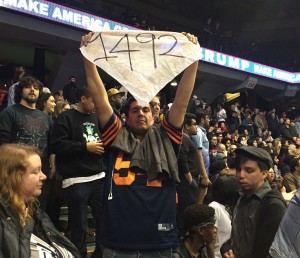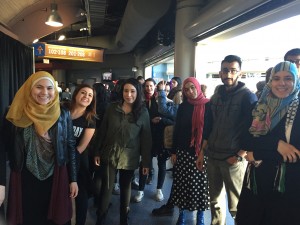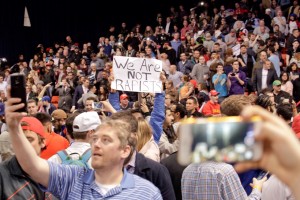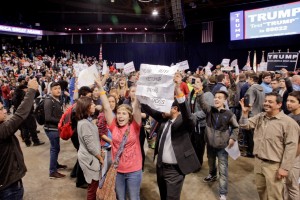Voices of participants tell story of cancelled Trump rally
By Jean Lotus for Chronicle Media — March 13, 2016
Aldo Reyes holds a bandana at the Chicago March 11 Donald Trump rally referring to the year Christopher Columbus arrived in the New World. “Let’s talk about the first illegal immigrants,” he said. (Photo by Jean Lotus/Chronicle Media)
Donald Trump’s March 11 no-show at University of Illinois-Chicago Pavilion resulted in skirmishes between supporters and protesters as both sides streamed from the auditorium into the crowded streets in the Chicago night air.
The scene at Racine Avenue and Harrison Street was filled with crowds both disappointed and elated. As word of the cancellation spread, many Chicagoans wondered about the significance of the rally and whether it would change the outcome of the GOP primary vote four days later.
Who was at the rally and why were they there?
Police estimated around 7,000 people filled the three-quarters full stadium. Audience members said they came for the spectacle, to witness history, to show support for Trump or solidarity with his detractors.
Richman Akin, wearing a red Trump cap, said he appreciated Trump’s “confidence and courage.”
“Donald Trump is a leader,” Akin said. “He says what he wants to. Honesty is a good trait in a leader because politicians all lie to us.”
“I think the Republican Party is imploding and I came here to witness that,” said Dan Mallon of Chicago.
Political history was on the mind of Fred Jones of Chicago, who said the Trump race reminded him of Richard Nixon’s campaign in 1972.
“Start with a Southern Strategy to co-opt the white voters and then galvanize your fearful constituency with a law-and-order platform.”
Retired Chicago Public School teacher Camille Einoder said she supported Trump because he acknowledged that the U.S. education system was “at the bottom of the list in the world.”

A group of Muslim students from University of Illinois- Chicago attended the March 11 Donald Trump rally wearing hijab head scarves. (Photo by Jean Lotus/Chronicle Media)
“I shudder at that statistic,” she said. She called the Trump rally an “American-style revolution” and said Trump supporters were sick of “an inactive patronage government.”
Trump’s business success showed he was a hard worker, she said.
“I think Donald Trump shows that when you have the backbone and the grit to succeed, you will succeed.”
A group of Muslim student friends from UIC clumped together in one section of the bleachers.
“I have to admit it feels intimidating,” said a student who gave his first name as Khalil and described himself as a “moderate right-wing Muslim American.”
He said in his experience most Muslims were socially conservative.
“The Republican party is not racist,” he said. “The other [GOP] candidates have said the Republicans can’t alienate American Muslims because we need their help to combat extremism — and I agree.”
Sisters and UIC students Summer and Hala Darayyad said they were not fearful of negative reactions from Trump supporters even though they wore long skirts and hijab head scarves.
“I’m proud to identify myself with who I am,” said Summer.

Some people used their cell phones to record the event. (Photo by James Balodimas/for Chronicle Media)
“I have my faith in God and I know it will be all right” said Hala.
Dan Gorman of Western Springs brought his teen daughter and her friend to witness history in the making.
“If Bernie Sanders is Occupy Wall Street, Trump is ‘Occupy Main Street,’” he said. “I think Trump has tapped into a mood of [voter] frustration and people are desperate to search for some kind of solution.”
Michael Hopkins, of Glenview, said Trump’s supporters felt “disenfranchised by the urban elites.”
“This is a historic time because there is a backlash against political correctness and it’s trickling down to ground zero. More people are speaking their minds.”
Hopkins said suburban and rural voters were frustrated by issues like transgendered bathrooms in schools.
“One kid can turn a whole school upside down,” he said. “Progressives have crossed the line way too far; the gay lobby is over the top and contaminating our schools,” he said.
Aldo Reyes, wearing a Chicago Bears jersey, held up a bandana inked with the number “1492.”
“Let’s talk about the first wave of illegal immigration,” Reyes said. Trump has said on the campaign trail he would deport undocumented immigrants, particularly those with criminal records.

Anti Trump supporters display smuggled-in signage to disrupt the March 11 Trump rally at the University of Illinois Chicago. (Photo by James Balodimas/for Chronicle Media)
A female Skokie voter, who gave her name as “J.J.” said she had voted Democrat all her life, but was now a Trump supporter.
“He’s bringing back a feeling of pride in America,” she said. “Our country needs a businessman to turn back the tide of lost jobs that the previous administration screwed up.”
“I know [Trump] makes his ties in China,” she added.
About 6:30 p.m., the crowd burst into cheers and boos when a spokesman announced Trump had decided to “postpone” the rally.
J.J. was disappointed. “This isn’t America anymore,” she said. “In 1968 [at the Democratic Convention] the politicians came to Chicago. They weren’t afraid.”
Scuffling broke out as protesters and supporters crowded to the floor of the auditorium. Chicago police officers, who had been assigned to the outside of the building entered the crowd. Students in the stands began to chant “We Stopped Trump!” and “Bernie, Bernie” while a group near the stage chanted “U.S.A.! U.S.A.!” Some people in the stands remarked that their cell phones were no longer transmitting texts.
“How can [Trump] deal with ISIS if he’s afraid of Chicago?” one young woman asked her companion.
As the crowd exited, Trump supporters threaded their way out of the stadium through protesters who shouted obscenities. Visitors in the UIC parking garage observed a group of men with baseball bats and hammers striking cars with Trump bumper stickers. Police officers chased the men out of the garage, but drivers trying to escape were blocked by other protesters who lay down in front of the garage exit. Police blocked off the Racine Avenue entrance ramp on the I-290 expressway. Five arrests and two injured officers were reported by Chicago police.
But by 9 p.m. the scene was abandoned to the street sweepers and cleanup crews. Chicagoans were left to ponder what the rally meant to the primary election, how it affected the trajectory of Trump’s campaign and who would be elected president in November.
—Voices of participants tell story of cancelled Trump rally—







